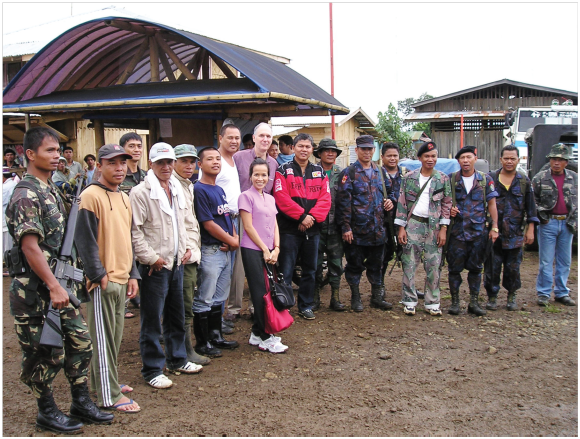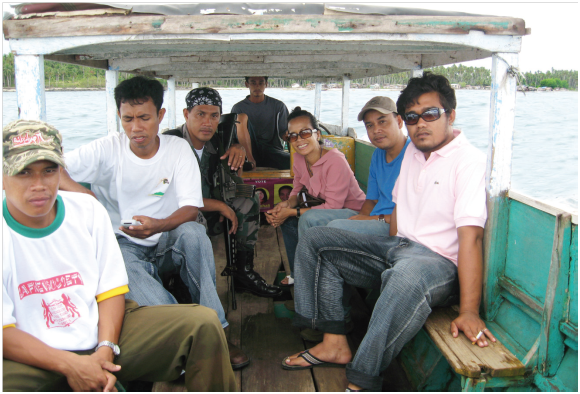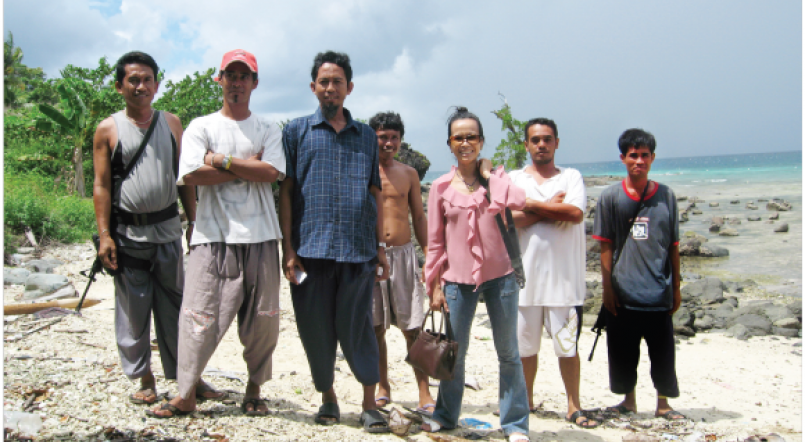I was raised in a squalid neighbourhood of huts on stilts in the Philippines with six other siblings. We had no electricity, no running water, no radio and no television. My father earned just over US$100 a month, and at nearly six years of age, I did not know letters or numbers.
Not far from our neighbourhood was a Catholic convent school, one of the best in the city. One day, the nuns from this school were visiting poor families and distributing food such as canned goods, and they found my sisters and I. They thought we were clever and later invited us to attend their school for free.
When I was 10, I smuggled a Time magazine from the school library and read it from cover-to-cover by the light of a kerosene lamp at home. I remember reading about the United Nations in New York and about exotic places like the communist Soviet Union. I was riveted by stories of war and hunger, scandals, leaders, celebrities, religion and art. “There’s a whole world out there”, I thought. And, I wanted to explore it.
I wanted to live in New York, to see the Eiffel tower, and even work with communists. Thus, I began the dream of living, working and leading in the world far beyond the confines of what I knew as home.
In over three decades, I lived and worked in the Philippines, the US, the former Soviet Union and Russia, Hong Kong and Singapore. I travelled widely, became a New Yorker, saw the Eiffel tower, and managed to work with communists!
I have learned many lessons on working with people across borders, languages, cultures, countries and institutions. I share three of these below:
1. Speak the language
The sounds and cadences of languages have fascinated me since childhood. Spanish sounded thick and passionate, French was elegant and sweet, and Russian was serious and heavy. As a 16-year old college student at the University of the Philippines, I started to learn Spanish, French and Russian. I continued learning these languages when I moved to the US.
Because of my language skills, I later landed a job as a writer for the Harvard-based Let’s Go budget guides. I covered roughly fifteen French and two Russian cities and towns in three and a half weeks. It was an intense and fun experience. I learnt that speaking different languages could – quite literally – open doors and open hearts. I stayed – and connected – with families that I was meeting for the first time. A friend in the US gave me the number of a very talented photographer in Leningrad (now St Petersburg), who introduced me to street musicians. We bonded and they took me to explore underground artist studios. This was made possible because I spoke fluent Russian.
In the early 1990s, I led the Moscow office of a Harvard project called ‘Strengthening Democratic Institutions’. I was a small, young, female Asian in a sea of tall Slavs, and was not likely to be perceived as anyone with authority. I was working with local and national officials, academicians, political reformers, media professionals and others.
Speaking Russian was indispensable in making contacts and establishing credibility. I had the opportunity to work with Eduard Shevardnadze, then foreign minister of the Soviet Union and was, in fact, in his home having tea shortly after the dramatic coup of August 1991.Without my Russian language, it would have been difficult (if not impossible) to develop the rapport, access and meaningful relationships I needed to work effectively in the Soviet Union.
The importance of language surfaced again when I arrived in Moscow once with several computers and printers in tow (in those days, such technology was not easily accessible locally). I was told before leaving the airport that I would not be able to take my boxes. To my frustration, airport officials would not give me a formal explanation. I assumed they wanted some form of payment. It was late in the evening, I was tired, so I went home with my driver. The next morning, I went to the Moscow City Council to complain. A city official was assigned to accompany me to return to the airport to retrieve my machines.
I was at the Sheremetevo airport customs area from 10am to nearly 5pm. In the course of the day, I talked my way progressively from one official to his superior. By the end of the day, I was speaking with the head of customs. Throughout this time, the city council bureaucrat was too nervous to say a word.
I was on my own.
I engaged the head of customs in a conversation, during which he told me that he had spent a short time as a visitor in Texas and had gone to other American cities as well. We joked about the eccentricities of New Yorkers and Texans; I remember us trying to mimic the Texas twang in Russian. We laughed. At the end of the conversation, he asked me what I needed. I told him about my computers and printers. Minutes later, we were loading my technology into a car. I did not pay a single ruble in bribes, fines, or fees.
I looked Filipino and spoke Filipino, but assumed too much and behaved like a brash New Yorker.
After leaving a job at AIG Global Investment in 2003, I received a call from the Vice Chairman of AIG (who had previously been an illustrious State Department official). He asked if I would take on a job for a White House-initiated project to expedite the peace process in the southern Philippines. This was after 9/11, when US foreign policy was concerned about potential Al-Qaeda infiltration of local insurgencies.
I said I had left the Philippines many years ago, had never worked there professionally, and did not know the Muslim minority in the south. He told me not to worry: I would learn and do a good job. So I accepted.
On my first trip to Mindanao, home of the Moro Islamic Liberation Front, I was filled with a sense of mission. I was eager to get to the bottom of the problem and address the issues head on and quickly. To increase efficiency, I set strict appointments and formal meetings.
On hindsight, I neglected to order meriendas (snacks that went beyond coffee and cookies) for my guests – a huge faux pas in the local culture.I felt smug in my own self-perceived “professional” performance, until a kind, young official working for the government peace panel – who was from my home island– informed me that the Muslim and NGO leaders had expressed disapproval about me, asking, “Who was THAT woman and what planet is she from?”
I looked Filipino and spoke Filipino, but assumed too much and behaved like a brash New Yorker. I failed an elementary rule in building relationships, which is to get to know one’s interlocutors first and establish trust between them and oneself. I had presumed authority without investing effort and time to help my local partners understand my purpose and motivations. In short, I flopped.
Needless to say, after the initial humbling feedback, I cleaned up my act. I listened more, dispensed of many American-style formalities, and bought meriendas for my guests. As a result, I gained the trust of people whose support was crucial for my own effectiveness.
Because I listened to them, they began to listen to me. Because I earned their trust, towards the end of my work I could go to many remote places to do research or conduct seminars without any military escort. I developed a network of young Muslim leaders from whom I learned a lot, and whose own exchanges helped diminish some intra-Muslim ethnic and political divides.
3. Work with those who own the problems
One of my greatest lessons in leading across borders came from a Moro chief named Ibrahim “Toto” Paglas III.He led a municipality of less than 30,000 people, where daily life was an exercise in fear and violence. Toto had lost his father and a younger brother when a grenade was lobbed into their home.He told me that he had an epiphany: Should he retaliate and do more of the same? Or, should he do something entirely different?

The author standing in front of the inspirational Toto Paglas (in white)
He chose the latter and proceeded with plans to launch a banana plantation in his municipality. Although there were many plantations in the southern Philippines, most were on Christian-owned lands. Nobody wanted to invest in Muslim areas because any such investment was perceived to be a losing and risky proposition.Toto went to an American investor and pledged his life as collateral for investment in Muslim lands. The investor was moved by the proposition, noting later how different this investment collateral was from the common ones he normally considered, involving detailed business development plans and financial projections.
He believed Toto would provide the necessary leadership in an area that was violent but had all the basic ingredients for success: water, land, and labor. In short, Toto launched a banana plantation and hired former guerillas, kidnappers, and anyone willing to change and earn an honest living. He studied drip irrigation technology in Israel and brought Jewish technicians to work in the heartland of the Muslim community. He succeeded in injecting hundreds of thousands of dollars of income into what was once a desolate place and, ultimately, turned a war zone into an economic zone.
Toto taught me that local people know best about their problems. To lead effectively across borders, it is critical to find people like Toto, listen to them, and leverage their experience and standing in the community.
My connection with Toto taught me to pontificate less and let leaders like him speak to their own people. I launched a series of discussion and networking sessions among young Muslim leaders of different ethnic groups, and invited Toto to speak in as many of these as possible. He emphasised Moro pride, denigrated laziness, and encouraged ambition. In business and in war, it was clear to me, leading meant listening to the people whose welfare, peace of mind, livelihood, and lives are on the line. They often know the problems best and can come up with unorthodox but effective solutions.

Sailing and building bonds with young Moro leaders
Today, I continue to work in new places and relish the discovery of new ideas, relationships and ways of doing things. I am learning a new language—Chinese—but with very little success to-date, I am afraid. The world is forever getting smaller. And, I am now more than ever convinced that leading across borders means speaking different languages, listening and establishing trust, as well as working with those whose own local experience and insights can easily trump the presumptions and hubris of well-meaning outsiders.
“Moro” is the term used commonly to refer to the Muslim minority in the Philippines.
This article was first published in HQ Asia (Print) Issue 04 (2012).


